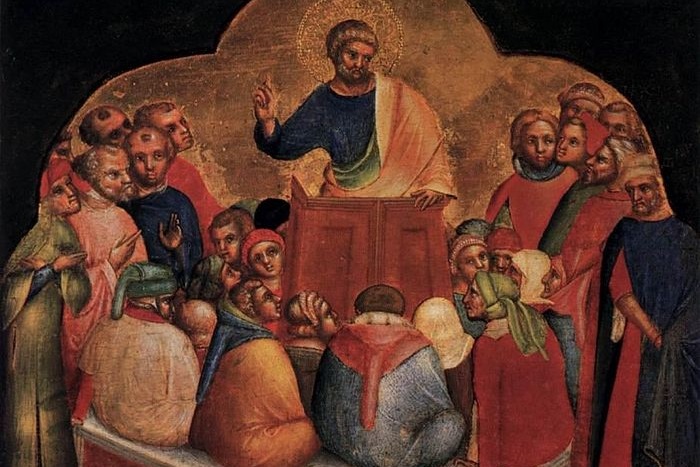
I say unto you, Lift up your eyes, and look on the fields; for they are white already to harvest. (John 4:35).
The Holy Orthodox Church celebrates the memory of Saint Nicholas of Japan, Equal-to-Apostles, the great missionary of our day. This saint was almost our contemporary. His heart was ablaze with the desire to share the joy of his faith in the Risen Lord with other nations, which hadn’t been enlightened by the Truth yet. The nation that became the object of his missionary effort according to God’s plan was the amazing and mysterious Japanese. Eager to pay homage to the glorious memory of the great missionary of the Russian Church and to remind everyone of the importance of keeping and acting in accordance with the Savior’s last words, which He uttered just a couple of minutes before his Ascension, Go ye therefore, and teach all nations, baptizing them in the name of the Father, and of the Son, and of the Holy Ghost (Matthew 28:19), we decided to share with you nine main principles of contemporary Orthodox missionary work we found in a lecture of the Rev. Sergius Timoshenkov, the associate professor of apologetics of Minsk Theological Academy and the chairman of the Synodal Missionary Department of the Belarusian Orthodox Church.
1. Missionary Friendliness
The normal condition of an Orthodox parish or monastery is when people are happy and friendly. We should treat every person calmly and amiably, being ready to help him or her if necessary. The attitude of parishioners towards a person who stepped into their church for the first time must be so welcoming that the person would have the same feelings as Apostle Peter who said, Lord, it is good for us to be here (Matthew 17:4). However, we should avoid the love bombing tactic employed by various sects, when friendly attitude turns into obtrusiveness and restricts the person’s freedom.
2. Focus on the Positive Side of Things
We must focus our testimony on the spiritual values and treasures of the Orthodoxy, on the joy that we Orthodox Christians have in Christ, rather than on the falsehood of heretics and sects. The Orthodox witness must be extremely cautious not to break the balance between knowledge of our sins and being sorry for them vs. knowledge of God and the joy that it brings us. Constant awareness of our sinfulness and persistent sorrow about our sins may lead to forgetting about the merciful and all-forgiving God. The Orthodox way of life is bittersweet, that is, it is full of joy mixed with tears.
3. The Principle of Incarnation
Jesus Christ was incarnated at a specific point in time and spent his earthly life in a certain culture. Likewise, our testimony must take its shape from objective realities of the contemporary world. When we talk about Christ and about the tenets of Christianity, we have to be able to use modern words that people understand. We have to be aware of the issues and problems that affect modern society.

4. Emphasis on Cross- and Multiculturalism of Christianity
History knows a lot of pathetic attempts of merging Christian doctrine with state ideology. For instance, we in Belarus have this common stereotype that “a Pole is always a Catholic, while a Russian is always an Orthodox.” This flawed approach needs to be challenged because the Orthodox truth is universal and can be expressed in any language and picked up by all cultures. Orthodoxy regards culture as an important yet peripheral means of expressing Christian ideas and notions.
5. Working to Ensure Positive Reputation of the Church
Nowadays, most people’s worldview is often shaped by borrowed stereotypes, which don’t match the reality more often than not. A missionary has to put a lot of effort into refuting the established negative stereotypes about the Church and believers.
6. Passing the People Who Got Interested in Orthodoxy from the Hands of the Missionary to the Hands of Catechists in Parishes
Strong support networks are key to successful mission. Mission means arousing one’s interest in Orthodoxy. It means sowing the seed of faith. That’s the missionary’s main task. However, there must be someone who could stimulate further development of that interest and kindle the newborn faith by all means and in all sorts of ways. The missionary should be able to direct that person to the existing church community, preferably a mission-oriented parish, for his or her catechisation as a potential parishioner. There have to be congregations that will treat the neophyte with care and benevolence.
7. Necessity of Unity
Jesus Christ said the following words right before his Passion on the Cross, That they all may be one; as thou, Father, art in me, and I in thee, that they also may be one in us: that the world may believe that thou hast sent me. (John 17:21). Orthodoxy regards lack of unity among Christians as a source of pain and sorrow. Mission and unity go hand in hand, which is why our testimony to heterodox Christians must include testimony of the unity of his disciples and their real-life experience of abiding in Christ. You can get this insight only in the Church. Hence, the re-unification of those who seceded from the Church for some reason is one of the tasks of a preacher, too.
8. Openness and Selflessness While Staying True to the Faith
We have to be able to use one of the chief approaches of Apostle Paul, i.e., To the weak became I as weak, that I might gain the weak: I am made all things to all men, that I might by all means save some. (1 Cor. 9:22) but still preserve our Orthodox identity and not give up the main tenets of our faith.
9. Staying Rooted in the Sacramental Life of the Church
Each Liturgy ends with these words, “Let us go forth in peace. In the Name of the Lord!” Not only does it mean a permission to leave the church but also calls us to get back from the eschatological reality of the Kingdom of God revealed through the Eucharist to this world and preach the joy and the fullness of being that we have acquired during the Mystical Supper of Christ. Therefore, each missionary must be aware of the fact that the Divine Liturgy and all other church services play an immensely important role in his or her life.
Following these principles will help a missionary to avoid serious mistakes in the challenging field of Orthodox mission work, which hardly brings immediate tangible results. We’ve got to remember that the conversion of every human soul is an action of God. No matter how gifted and persuasive a missionary might be, it is the Lord not the missionary who makes people believe. The ministry of a missionary prepares the path and sets the ground for one’s reception of the Divine grace and for the encounter of the human being with his or her Creator. That’s exactly what Apostle Paul wrote about, I have planted, Apollos watered; but God gave the increase. So then neither is he that planteth any thing, neither he that watereth; but God that giveth the increase (1 Cor. 3:6-7).



